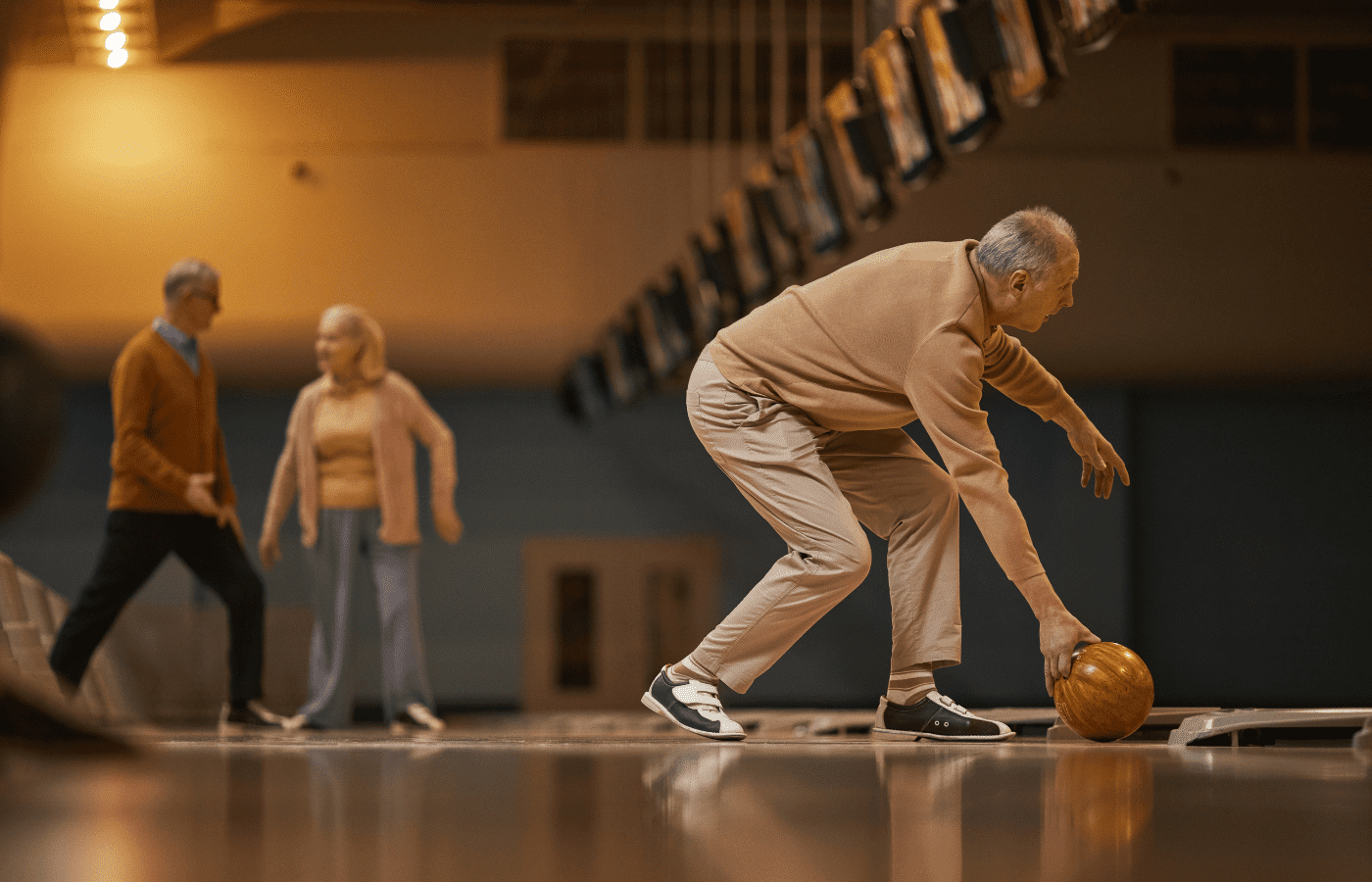Total knee replacement surgery, otherwise known as knee arthroplasty, is a procedure that has benefited individuals who suffer from severe knee arthritis and are no longer able to perform daily activities without pain. For avid indoor bowlers and other sports enthusiasts, returning to their beloved activities pain-free may be on the top of their priority list following their surgery.
Because indoor bowling is a low-impact sport, you can definitely bowl with a knee replacement after you have recovered from your surgery. By following the recovery plan set out by a physician, you can avoid unnecessary pain and prevent future injuries.
The rest of this article will go on to discuss knee replacement surgery recovery and activities that should or shouldn’t be continued after recovery. The material in this reading does constitute medical advice. It is provided for informational purposes only and should be discussed with a medical professional to ensure that it is appropriate for your circumstances.
Is It Safe for Me to Go Bowling After a Total Knee Replacement?
Dr. Haverbush, an orthopedic surgeon, has suggested that bowling is generally safe for people with knee replacements.
Bowlers may want to consider using a lighter bowling ball to reduce stress on their knees and should stop the activity if it begins to cause any pain or discomfort. Be careful when walking in the bowling alley to avoid slipping and causing strain on your knee.
Another way to help ensure your knee is safe is by using a knee brace. We recommend using a hinged knee brace like this one from Amazon. It offers great knee support and has removable hinges.
What Other Sports or Activities Can I Do After My Knee Replacement?
Dr. Haverbush suggests that people who have undergone knee surgery should only participate in low impact and low duration activities due to the possibility that the knee prosthesis may mechanically fail. He recommends that the following activities are likely safe after a knee replacement:
- Bowling
- Walking
- Slow dancing
- Cycling
- Golf
- Low impact aerobics
- Croquet
- Shuffleboard
- Horseshoes
The following activities can be completed if you already have some experience:
- Cross country skiing
- Hiking
- Rowing
- Non-competitive tennis
- Some weight training
- Ice skating
What Sports or Activities Should I Avoid After My Knee Replacement?
Dr. Haverbush suggests avoiding the following activities:
- Rock climbing
- Soccer
- Singles tennis
- Football
- Gymnastics
- Volleyball
- Downhill skiing
- Running
- Jogging
- Basketball
- Hockey
- Lacross
- Roller blading
- Inline Skating
What Is the Recovery Time for a Total Knee Replacement?
Arthritic Health states that the recovery time is generally between three to six weeks for normal daily routine activities. However, it can take from six months to a year before a patient has fully recovered. Therefore, it is important to talk with your doctor and listen to your body carefully before starting any new activities that may cause pain or damage to your knee.
Will My New Knee Feel the Same as My Old One?
Arthritic Health explains that your new knee will likely feel different than your natural knee. Patients in a small study noted that they felt aware of their new knee especially when climbing stairs, kneeling, or rising from sitting. Symptoms such as stiffness, soreness, swelling, or numbness have been reported; however, the overall pain and function should improve.
Should I Do Physiotherapy After a Total Knee Replacement?
It is important to get your knee moving after receiving a replacement. John Hopkins Medicine suggests meeting with a physiotherapist immediately in order to develop an exercise program which you will begin about a week after surgery.
While still in the hospital, you may begin on a continuous passive motion (CPM) machine while you are still resting in your hospital bed. This machine moves your knee through its entire range of motion.
How Can I Reduce My Overall Recovery Time After Knee Surgery?
The Noyes Knee Institute recommends the following tips for increasing your recovery time following total knee surgery:
- Follow all of the advice of the medical experts who are assisting you with your recovery.
- When you are able to, walk frequently. Walking improves circulation which increases the blood and oxygen to your knee. This will in turn minimize swelling.
- Maintain a healthy diet. Eating a balanced diet of fruit, vegetables, whole grains, and other nutritious food provides your body with the vitamins, nutrients, and minerals essential for recovery.
- Get enough sleep. Our bodies are designed to heal themselves during sleep when other bodily functions are put to rest.
- Do physical and occupational therapy. This therapy teaches your body how to use your new knee by focusing on motion, strength, and conditioning in a safe way. Ignoring this aspect of your recovery is likely to prolong your recovery time.
How Long Will My Knee Replacement Last?
John Hopkins Medicine states that an artificial knee replacement will only last approximately 15-20 years. After this time, a patient may require revision surgery.
Are There Alternatives to Knee Arthroplasty?
Total knee surgery is not always the best option when considering how to improve your knee pain. John Hopkins Medicine suggests considering the following to ease knee pain:
- Losing weight to reduce stress on your knees
- Low impact activities to strengthen and increase knee flexibility
- Knee injections such as cortisone shots that lubricate knee joints
- Cartilage regeneration techniques
- Radiofrequency Alblation controls knee pain by destroying sensory nerves
Final Thoughts
There is a very good chance that your life will improve after getting knee replacement surgery especially if you take care of yourself during your recovery and follow the recommendations of your doctor.
Although you may be eager to return to bowling or other activities, it is imperative that you don’t do them until your knee has properly recovered. It is important to allow your body to build up its strength and flexibility to avoid unnecessary pain or complications.
Relief from daily pain caused by knee arthritis will allow you to get back to the activities you love. If bowling is your thing, rest easy knowing that this low-impact sport is generally considered a safe activity for people with knee replacements.


